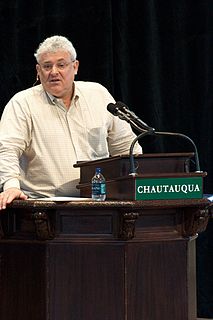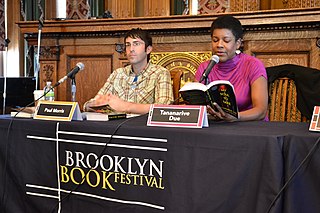A Quote by Nick Sagan
As a science-fiction writer, I feel my responsibility is to look ahead and see the dangers of what might happen and try to warn people of the potential pitfalls.
Related Quotes
Science fiction is fantasy about issues of science. Science fiction is a subset of fantasy. Fantasy predated it by several millennia. The '30s to the '50s were the golden age of science fiction - this was because, to a large degree, it was at this point that technology and science had exposed its potential without revealing the limitations.
I think the least important thing about science fiction for me is its predictive capacity. Its record for being accurately predictive is really, really poor! If you look at the whole history of science fiction, what people have said is going to happen, what writers have said is going to happen, and what actually happened - it's terrible.
I have always been intensely uncomfortable with the idea of a science fiction writer as prophet. Not that there haven't been science fiction writers who think of themselves as having some sort of prophetic role, but when I think of that, I always think of H.G. Wells - he would think of what was going to happen, and he would imagine how it would happen, and then he would create a fiction to illustrate the idea that he'd had. And no part of my process has ever resembled that at all.
People ask, 'Is the science going to run ahead of the ethics?' I don't think that's always the problem. I think it's that the science runs ahead of the politics. Bioethics can alert people to something coming down the road, but it doesn't mean policy and politicians are going to pay attention. They tend to respond when there's an immediate crisis. The job of the ethicist, in some ways, is to warn or be prophetic. You can yell loudly, but you can't necessarily get everybody to leave the cinema, so to speak.
You look at science fiction and look how often it talks about being alien, being alienated about the other. Look at the number of blue people - 'Avatar,' I'm looking at you. And it is now easier to find people of color in science-fiction literature and media, but the issues of representation are still really, really troubling.
I define science fiction as the art of the possible. Fantasy is the art of the impossible. Science fiction, again, is the history of ideas, and they're always ideas that work themselves out and become real and happen in the world. And fantasy comes along and says, 'We're going to break all the laws of physics.' ... Most people don't realize it, but the series of films which have made more money than any other series of films in the history of the universe is the James Bond series. They're all science fiction, too - romantic, adventurous, frivolous, fantastic science fiction!
Science fiction is a weird category, because it's the only area of fiction I can think of where the story is not of primary importance. Science fiction tends to be more about the science, or the invention of the fantasy world, or the political allegory. When I left science fiction, I said "They're more interested in planets, and I'm interested in people."
One of the dangers of science fiction, particularly bad science fiction, is that you have these scenes where the characters turn to a blackboard and start explaining how this faster-than-light drive works, or something like that. We never really have those conversations in real life. That's not part of the way we interact as human beings.





































